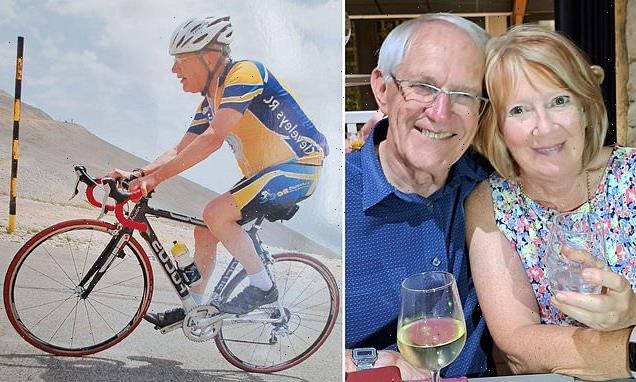
‘I kissed Harry goodbye… an hour later he was fatally injured’: VALERIE COLLEDGE recalls her husband’s tragic death after his bicycle hit a pothole
Shortly before 10am on January 2, my husband Harry headed out from our Lancashire village home for a short bike ride. ‘I won’t be long,’ he announced as he kissed me goodbye. We planned to take a walk on the beach that afternoon.
Instead, those would be the last words that my husband of 42 years would ever say to me. About an hour later, his bicycle hit a pothole 9in deep, catapulting him into the road, breaking his neck in two places and leaving him fatally injured.
Despite the heroic efforts of onlookers and the NHS doctors who fought to save Harry, his life-support machine was switched off that same afternoon. I held his hand, I said goodbye to him.
It was a tragically premature end to a full and busy life: Harry may have been 84, but he was active, healthy and a gifted artist. He enjoyed playing his clarinet and saxophone and had been rehearsing for a performance at a concert to be held in our local church.
Now his life has been abruptly ended. And why? Because many of our roads, particularly in rural areas, are so riddled with potholes that they are not fit for purpose. And despite endless warnings about the serious threat they pose to motorists and cyclists alike, councils all too often turn a blind eye.
VALERIE COLLEDGE: I kissed Harry goodbye… an hour later his bike hit a hole and he was fatally injured (Valerie and Harry are pictured together)
Certainly, concerns had been raised with our county council, Lancashire, more than once about the trench-like hole in the busy rural road that caused Harry’s death. In fact, so parlous was the state of that entire stretch of road that police who arrived at the scene of his accident insisted on staying there until the council came to do a temporary fix.
Just six days later when I visited the scene myself, that ‘fix’ was already crumbling at the edges. This tells us everything we need to know about the haphazard approach both local councils and central government take to our infrastructure – even when it is costing lives. In the past five years, my local council alone has paid out £11million in compensation to people injured due to potholes.
This astonishing sum could surely have been better deployed on repairing potholes thoroughly in the first place. Harry knew the dangers only too well: he often told me that poor road surfaces meant that the cycling he had loved since he was a boy latterly felt like a game of Russian roulette, leaving him facing the grim choice of either taking his chances riding through them or risking swerving into traffic.
Nonetheless, he would not be deterred and went out on his bike most days. January 2 was no different. On a beautiful, bright sunny day, he headed out at about 10am for a short ride into nearby Garstang to meet a friend.
Valerie was phoned by the police to tell her Harry had been in an accident – by the time she arrived at the hospital, she knew he was gone (Harry is pictured on his bike)
He had his accident while with that friend. Riding ahead, his friend heard a crash, and turned to see Harry sprawled on the road, unconscious.
I learned the news around an hour later as I ran some errands. The police rang me on my mobile to tell me Harry had had an accident. When I was greeted at the hospital by a family liaison officer, I knew he was already gone.
Six weeks on and I, along with Harry’s three children, am in the early stages of grieving. We’re trying to come to terms with Harry’s loss, but aside from the shock and disbelief there is huge anger, too.
Any death is hard to process, but an avoidable death particularly so. If that hole had not been in Harry’s path he would not have died that day. It is a bitter pill to swallow, particularly when I know we have the technology to fix holes seven times faster than in the past.
That technology now needs to be deployed on every road in the country – and the menace of Britain’s potholes brought to an end.
Until that day, too many others like me will receive that life-changing phone call.
Source: Read Full Article

